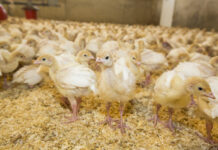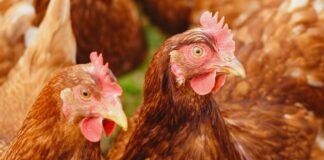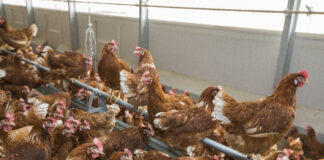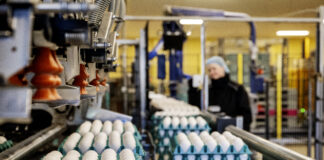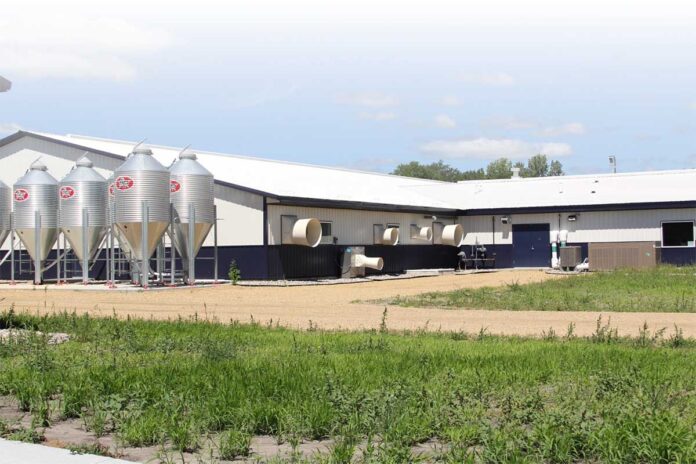
As we move to using less antibiotics in the production of poultry, many alternative products have been developed. While some are affective in specific circumstances, they are not as affective at treating or preventing diseases and production problems as antibiotics.
As we move forward, it is important to remember that there are no “silver bullets” that will fix issues that can arise on farms and that we need to concentrate on basic management skills. When looking at management, growers need to concentrate on things they can actually impact.
Examples include:
- pre-placement
- temperature management
- light management
- feed management
- air quality/ventilation
- water management
- biosecurity.
Pre-placement
Pre-placement includes all the steps prior to receiving birds. It starts when the last flock leaves and includes managing the litter, cleaning the barns and equipment, and performing required maintenance. Make sure to ventilate between flocks, especially if you are windrowing, as this will help dry the litter and remove unwanted gasses. Before the arrival of the chicks, is a great time to make sure that all sensors and alarms are working properly. When preheating the barns it is important to start early enough to get the floors at the proper temperatures to avoid chilling the chicks when placing them. Conducting regular maintenance is much easier to do while the birds are not in the house, so use this time to check/work on fans, tunnel doors and curtains as well as lights.
Temperature management
Temperature management, means having the correct temperature that keeps the birds happy and stress free. Use thermometers to set temp prior to placement, but once placed, use the birds’ behavior to adjust the temp to make them comfortable. Make sure to check floor temp as well as the air temperature by using an infrared thermometer. Simply cleaning the reflectors on radiant heaters can increase their efficiency, thus reducing propane usage, and increasing the floor area heated.
Light management
Light management is often downplayed as to its importance in growing birds. During brooding, uniform lighting is important in helping the chicks find food and water. Lighting is also important in regulating bird behavior, dim lights less activity, while bright lights will increase bird movement and can lead to poorer feed conversion. Lighting is also believed to be an important consideration for bird well-being. Cleaning lights properly between flocks can help improve production.
Feed management
Feed management is all about presenting the feed to the birds in a way that promotes growth. It starts with checking the feed when delivered to make sure it is the proper size for the birds. By checking early, you will have time to fix any miss delivered feed. Make sure all feed pans are full and that the control pan is working properly. Walk the whole house and check each pan, don’t assume everything is ok just because you have feed at the control pan. Use supplemental feeders for the first few days to increase the amount of feed available to the chicks. Refresh feed multiple times a day to encourage birds to eat. Adjust feeder height as the birds age to help prevent feed wastage.
Water management
Water management involves all aspects of the water system as well as water consumed by the birds. Cleaning water lines is an important part water management and involves two different programs, cleaning between flocks and daily water treatment. When cleaning lines, always follow the directions from the manufacture of the product you are using. Water lines need to be adjusted regularly and always walk birds a couple hours after placement to see if litter has settled and birds can still access the water.
Air quality/ventilation
Air quality/ventilation are important for bird health. Remember that the fans work as water pumps, removal of CO2 and ammonia, as well as provide for fresh air in the barns. Make sure to increase fan time as birds age to remove the increase in water used by the birds. Simple hygrometers can help you determine the humidity in the barns. If you have attic vents, use them, but keep it simple!
Biosecurity
Biosecurity can be made simple and easy. Use common sense to protect your birds from diseases. An often overlooked part of disease prevention is mortality management. Make sure that birds are disposed of properly and promptly. Dispose of birds in an approved method and make sure scavengers cannot get access to them and spread them around your or other farms.
While focusing on the very basic parts of management may seem simplified, you will find that it will help reduce stress on birds and improve performance. Finally, by focusing on these basic principles, you will be spending more time with your birds which will allow you to identify problems earlier and address them quicker.
From the Proceedings of the Midwest Poultry Federation 2020



